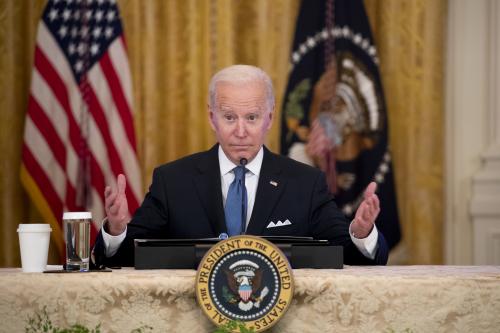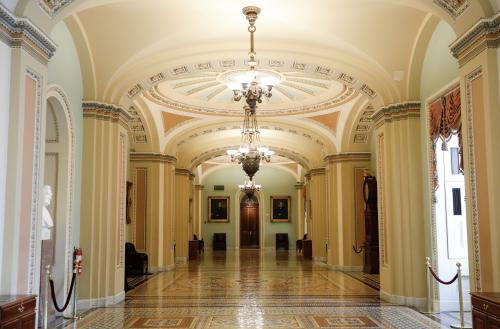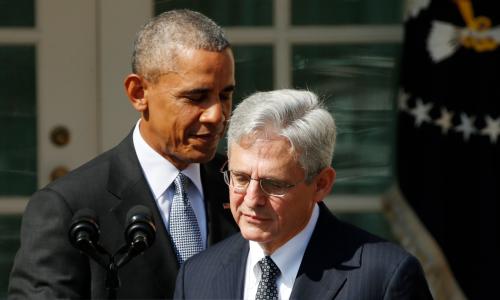President Trump’s failure to fill important government jobs has come home to roost. Government vacancies may end up being the most significant problem Trump ends up facing—even bigger than the loss of a Senate seat in Alabama, and even bigger than his abysmal approval ratings.
According to the Partnership for Public Service, there are 620 Senate-confirmed “key positions” in the federal government—not a lot considering that the federal government consists of 4.4 million people when you include the military. These jobs account for .0001409 percent of the workforce. Failing to fill these jobs will not have a considerable effect on the size of the government which, in terms of both size and complexity, is massive compared to Donald Trump’s real estate business. These jobs, appointed by the president and confirmed by the Senate, are the means by which a president puts his mark on the government and manages a massive bureaucracy.
But as of this writing, Trump has only 208 of these jobs filled and confirmed by the Senate. There are another 159 positions that have been nominated but not confirmed. There remain 247 jobs for which there is not even a nominee. And here’s where the problem begins.
To date, these jobs have been filled by senior civil servants in an “acting” capacity. However, according to the Federal Vacancies Reform Act of 1998, they can only serve in an acting capacity for 300 days after a president is sworn in, beyond which point they are not allowed to stay in the office. In other words, time ran out sometime in mid-November for civil servants who became acting appointees on Inauguration Day.
All this adds up to a government that continues to implement the status quo. This may not matter over at the Transportation Department (with two major vacancies) which was not a focus of Trump campaign promises beyond a commitment to an infrastructure bill that still has not passed. Yet, four vacancies for high-level posts at the Environmental Protection Agency may severely limit the president’s ability to change policy in an area where he has committed to significant reform.
A second major problem is that actions taken by an acting officer whose time has run out open up the possibility of litigation. The Congressional Research Service report on the Vacancies Act states:
“Arguably, the most direct means to enforce the Vacancies Act is through private suits in which courts may nullify noncompliant actions. The Vacancies Act appears to render noncompliant actions void.”
The CRS brief goes on to outline the difficulties in bringing court actions. Still, the possibility of litigation means that, where Trump policies are enacted by an “acting” officer whose time has run out, such actions could be reversed by the courts or rendered, as the Supreme Court has ruled, “void ab initio.”[1]
By not filling the leadership jobs in his government Trump is limiting his power and opening up the possibility of his legacy being reversed by the courts. The interesting question is why.
In the president’s own words:
“ I’m generally not going to make a lot of the appointments that would normally be—because you don’t need them. I mean, you look at some of these agencies, how massive they are, and it’s totally unnecessary. They have hundreds of thousands of people.”
This is Trump distancing himself from the very government he’s in charge of. As previous presidents have discovered to their chagrin, when something goes wrong (remember FEMA’s failure to cope with Hurricane Katrina, or the Veteran’s Administration failure to cope with massive backlogs), the American people blame the president. But if there is no one home to tell the president where trouble is likely, failure will come out of nowhere. Telling the American people “It’s not my fault,” isn’t a very good option. Just ask Presidents Bush and Obama.
Presidential appointees promote the president’s agenda and seek to use the discretion written into the law to do what the president wants. And they can warn presidents about problems in agencies before they blow up in the president’s face. In other words, appointees are important to presidential success, but vacancies are a recipe for failure.
Elaine C. Kamarck is author of Why Presidents Fail and How they Can Succeed Again.
[1] NLRB v. SW Gen. Inc, 137 S. Ct. 929, 938 n.2 (2017)
The Brookings Institution is committed to quality, independence, and impact.
We are supported by a diverse array of funders. In line with our values and policies, each Brookings publication represents the sole views of its author(s).









Commentary
Federal vacancies have left Trump’s government home alone
December 14, 2017